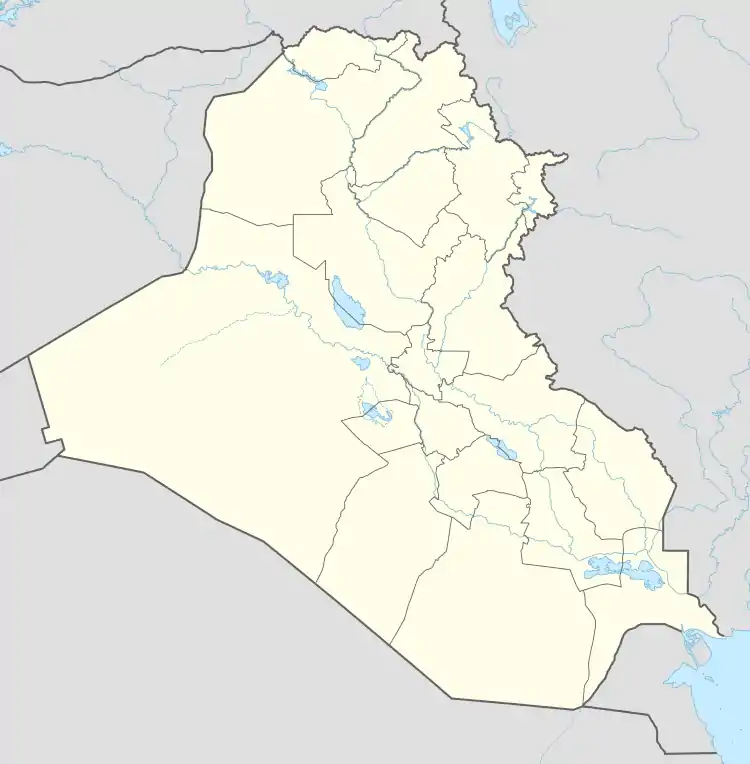Bamarni
Bamarni (Arabic: بامرني,[1] Syriac: Beth Mūrdānī,[2] Hebrew: במרני,[1] Kurdish: Bamernê)[3] is a village and sub-district in Dohuk Governorate in Kurdistan Region, Iraq. It is located in the Sapna valley in the district of Amadiya.
Bamarni | |
|---|---|
 Bamarni Location in Iraq | |
| Coordinates: 37°07′16″N 43°16′09″E | |
| Country | |
| Region | |
| Governorate | Dohuk Governorate |
| District | Amadiya District |
| Sub-district | Bamarni |
The village is located in a mountain gorge and has a strong Naqshbandi presence.[4]
History
A Nestorian community at Bamarni is attested in the 10th-century Life of Rabban Joseph Busnaya.[5] A Jewish community also previously resided at Bamarni.[6] In the early 20th century, Bamarni was the residence of the Naqshbandi Sheikh Bahā al-Dīn, whose house and takiyya was destroyed by the British in August 1919, but was later permitted to return.[7] At this time, there were six or seven Jewish households.[7]
An airport was partially constructed near Bamarni for use by Saddam Hussein to visit his residence in the vicinity, and was then known as Sarsing airport.[8] It was bombed in 1991 during the Gulf War, but was rebuilt soon after by the US 133rd Naval Mobile Construction Battalion as part of Operation Provide Comfort.[8] The Turkish Armed Forces began to operate from the airfield in 1996, and established two bases at Bamarni as part of an agreement with the Kurdistan Democratic Party, during the Iraqi Kurdish Civil War.[6]
The Turkish base's facilities were upgraded in 2006, and was the scene of a 90-minute standoff on 21 February 2008 after Turkish forces, consisting of approximately 350 soldiers in armoured vehicles and around 12 tanks, attempted to leave the base on deployment without prior notification to the Kurdistan Regional Government, and thus were blocked by the Peshmerga, causing the Turkish forces to return to base.[9]
In December 2020, Miran Abdulrahman was appointed mayor of the sub-district, making her the first female mayor in Dohuk Province.[10]
References
- "Jewish Quarter, Bamarne, Iraq". Diarna: The Geo-Museum of North African and Middle Eastern Jewish Life. Retrieved 22 August 2020.
- Carlson, Thomas A. (14 January 2014). "Beth Mūrdānī". The Syriac Gazetteer. Retrieved 22 August 2020.
- "Civilian vehicles bombed by Turkish jets in South Kurdistan". Firat News Agency. 26 July 2020. Retrieved 22 August 2020.
- فرنسيس, بشير يوسف. موسوعة المدن والمواقع في العراق - الجزء الأول (in Arabic). 1. p. 119. ISBN 9781780582627.
- Wilmshurst (2000), p. 133.
- "Cave at Bamarne, Iraqi-Kurdistan". Diarna: The Geo-Museum of North African and Middle Eastern Jewish Life. Retrieved 22 August 2020.
- Zaken (2007), p. 265.
- "Turkish bases in northern Iraq". Conflict Intelligence Team (in Russian). 18 December 2015. Retrieved 22 August 2020.
- Jenkins (2008).
- Nasri, Ayub (3 December 2020). "First woman mayor appointed in Duhok Province". Rûdaw. Retrieved 3 December 2020.
Bibliography
- Jenkins, Gareth (2008). "Unwelcome Guests: The Turkish Military Bases in Northern Iraq". Terrorism Monitor. 6 (6). Retrieved 22 August 2020.
- Wilmshurst, David (2000). The Ecclesiastical Organisation of the Church of the East, 1318–1913. Peeters Publishers.
- Zaken, Mordechai (2007). Jewish Subjects and Their Tribal Chieftains in Kurdistan: A Study in Survival. Brill.
